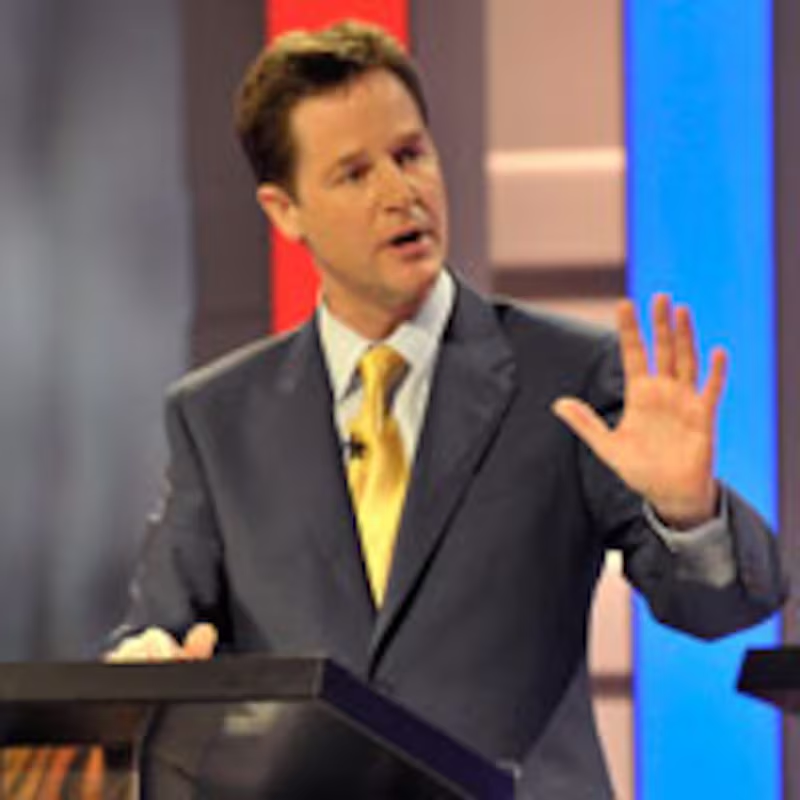
Not since Tony Blair ushered in the era of Cool Britannia more than a decade ago has a U.K. politician been imbued with the aura of celebrity that now attends Nick Clegg, the 43-year-old leader of the Liberal Democrats.
Clegg, a youthful-looking onetime university lecturer, was unknown to huge swaths of the country until the first leaders’ debate last week. His performance in that showdown with Prime Minister Gordon Brown and Conservative Party challenger David Cameron transformed Clegg's status from that of an also-ran to "the British Obama." The British press has been filled with tales of “Cleggmania” and the coffers of his party have been swollen by a surge of new donations—fundamentally changing Britain’s political landscape.
“Marcel tells very funny stories of having to take the wheel for hours, while Nick tuned into his meditative goals, going ‘Om’ or whatever,” says Harris. “It’s quite a strange picture, given how besuited he is now.”
The hyperbole has reached stunning heights. Last weekend, the London Sunday Times revealed that Clegg’s approval ratings made him “the most popular party leader since Winston Churchill.” The story was based on genuine results—Clegg’s approval rating of 72 percent was second in modern polling only to Churchill’s 83 percent at the end of World War II in 1945.
Not bad for a guy who has no realistic chance of actually becoming prime minister.
Theoretically, Clegg’s Liberal Democrats could win a bigger share of the vote than any other party and still be confined to third place in the House of Commons. The quirk is the result of Britain’s geopolitical patterns and parliamentary arithmetic, which tends to reward popular support that is concentrated in regions—rural and southern England for the Conservatives; the north, Scotland and Wales for Labour—rather than the more evenly distributed backing enjoyed by the Liberal Democrats.
Still, in the midst of a horrid economy, and with the British political firmament otherwise devoid of stars, Clegg is a very, very good story. The man himself seems to have struck a resonant chord with the country’s tastemakers as well as the electorate at large—just by proving he is not “a dreary old bore,” as his longtime friend Pippa Harris told The Daily Beast.
Harris met Clegg when the two were students at Cambridge University. Clegg acted in a version of Cyrano de Bergerac produced by Harris and directed by future Oscar-winner Sam Mendes. Clegg “didn’t have a particularly huge role, but he did have a lot of enthusiasm,” Harris recalled.
Harris now runs a movie and theater production company with Mendes, director of such acclaimed films as American Beauty, Road to Perdition, and Revolutionary Road, in addition to numerous theater hits. For her birthday last year, she said, “Sam and Kate and Nick” all came to supper at her house. “Kate” is Kate Winslet, who is married to Mendes, though the couple has since separated. (Evincing characteristic British tact, Harris volunteered no details of the evening and added that while Mendes and Clegg are “good, old university friends,” she did not “want to speak for Sam in terms of his political views.”)
Stephen Tall, a Liberal Democrat blogger, noted that even Harry Potter himself—actor Daniel Radcliffe—has announced his support for the party in the forthcoming elections, as has fellow thespian Colin Firth.
Tall noted that Clegg has the key modern accoutrement of the fashionable politician—an exponentially growing Facebook group which, in Clegg’s case, has more than 100,000 members dedicated to getting the Lib Dems, as they are popularly known, into power.
If Clegg’s modishness is a source of enthusiasm and inspiration for some, however, it is regarded with skepticism and distaste by others.
John Rentoul, a political commentator for Britain’s Independent on Sunday and the author of an acclaimed, sympathetic biography of Tony Blair, complained that Clegg’s rise was largely the consequence of two things: a tide of anti-political-establishment sentiment unleashed when numerous British MPs were exposed last year for having made highly dubious expense claims, and an “an X-Factor-style debate.” (The X Factor is a British star-making show, akin to American Idol.)
Rentoul’s personal dealings with Clegg, he said, left him with the impression that “he is a very personable chap.”
“He’s charming, he’s thoughtful,” Rentoul said. “But I’ve never been impressed with him as a potential statesman.”
For good or for ill, Clegg is certainly different. Part of his distinctiveness stems from his family background. His mother is Dutch, his father half-Russian, a combination that led the reliably right-wing Daily Mail to describe him as “by blood the least British leader of a British political party.” His paternal grandmother, an aristocrat, fled Russia at the time of the revolution.
Clegg speaks five languages and once worked for the European Commission. In Brussels, he met Miriam Gonzales Durantez, the daughter of a Spanish politician, whose exotic looks are described as “a cross between Penelope Cruz and Sophia Loren,” by Pippa Harris. The couple married in Spain in 2000.
Miriam is a high-powered attorney for a prominent law firm, and is far removed from the stereotypical subservient political wife. When the first of the couple’s three children was born, Clegg took extended paternity leave and his wife, who out-earns him, returned to work.
“Miriam just carried on doing her job,” said an admiring Harris. “If she has a Sunday free, then she might think about coming out on to the campaign.”
Clegg, she added, “takes the kids to school every morning. He’s a really good, fun dad, which is probably to do with his own background. He was one of four children, and I think they had a really good, rambunctious time growing up.”
Clegg’s adventures later in youth have become the stuff of legend. At 16, while an exchange student in Germany, he got into trouble for setting fire to some precious cacti belonging to a local professor.
Shortly after university, he embarked on a road trip across America in the company of two brothers, Louis and Marcel Theroux. (The sons of Paul Theroux, the two have subsequently found their own measure of fame, primarily as a TV documentary-maker and novelist, respectively.) The trip was enlivened by Clegg’s enthusiasm for transcendental meditation.
“Marcel tells very funny stories of having to take the wheel for hours, while Nick tuned into his meditative goals, going ‘Om’ or whatever,” says Harris. “It’s quite a strange picture, given how besuited he is now.”
(Clegg told one interviewer that his interest in meditation cooled after he felt he reached a point when it became excessively “inward-looking.” Marcel Theroux, though still close to Clegg, declined to comment for this article.)
Before Clegg found his path in politics, he tried his hand at journalism. At one point he served as an intern for Christopher Hitchens at The Nation. Clegg worked out of the magazine’s New York office, however, which meant he rarely met the D.C.-based Hitchens. (Hitchens declined to comment for this article.)
His political rise has been astonishingly fast. He was elected to the European Parliament—a less high-profile role than it sounds—in 2001. It was not until 2005 that he made it to the House of Commons. The Liberal Democrats were about to enter a period of turbulence—one leader, Charles Kennedy, resigned after admitting to an alcohol problem and his successor, party veteran Menzies “Ming” Campbell, remained at the helm for only 19 months. Clegg won the leadership by a paper-thin majority in late 2007.
His tenure as leader has had its blips. The most famous came when he was pressed for details of his sexual history by journalist Piers Morgan in an interview for the British version of GQ. He ill-advisedly answered when asked whether he considered himself good in bed (“I don’t think I’m particularly brilliant or particularly bad”) and, when quizzed on the number of women he had slept with replied, “No more than 30.”
The pun-loving British press soon christened the resulting furor the “Cleggover” affair.
Even his friend Pippa Harris admits it was “a bit naïve” of Clegg to answer the questions. “It’s not him to have lots of lovers in the first place, and certainly not him to boast about it. I don’t think Miriam was particularly amused by that the next morning.”
The debate may have erased whatever unpleasant memories that episode created. Julian Glover, a political columnist with The Guardian, told The Daily Beast that the post-debate boost to the Lib Dems’ fortunes is clearly more than a one-day wonder: “If it was going to disappear, it would have done so by now.”
But he also looked askance at stories like the one comparing Clegg with Churchill, saying that they “make you wonder what planet you’re living on.”
So far, it is the Conservatives who have most to lose from the Liberal Democrats’ rise. The Tories had been in the lead in the polls but still faced a hard climb to win an overall majority. A strong Liberal Democratic showing would make that task almost impossible.
Conservative leader David Cameron, whose appeal as the candidate of change has been seriously undermined by Clegg’s surge, tried to retake that mantle on Monday. In an interview with The Guardian, he warned discontented voters that any outcome other than a decisive Tory victory in the May 6 election would mean that “you risk being stuck with what you have got.”
Cameron was referring to the now-strong possibility of a hung parliament, and a Labour-Lib Dem coalition taking the reins. While Gordon Brown has left the door conspicuously open to this possibility—he referred on Monday to “common ground between Liberal Democrats and us”—it is widely expected that Clegg might demand Brown’s head as the price for keeping Labour in power.
A truly exceptional vote for the Liberal Democrats would also pose serious peril for Labour’s broader future—not least because, if the Conservatives’ core support held up, Clegg’s party could come close to surpassing Labour in the House of Commons.
Such a shift, brought about by such an unconventional champion, would do what every Liberal Democrat leader has promised to do, without success: Break the mold of British politics.
Niall Stanage is a New York-based, Irish-born journalist and the author of Redemption Song: An Irish Reporter Inside the Obama Campaign (Liberties Press, Dublin).






